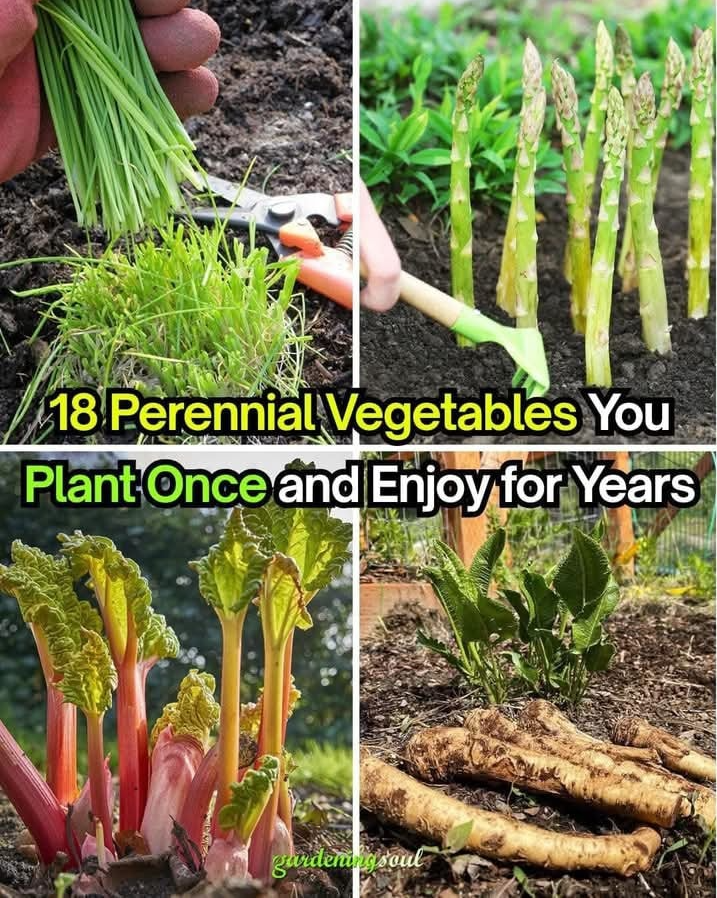Here are 18 top perennial vegetables you can plant once and harvest for many seasons:
-
Asparagus – A spring favorite, productive for up to 20 years.
-
Rhubarb – Technically a vegetable, great for desserts and sauces.
-
Jerusalem Artichoke (Sunchoke) – Nutty-tasting tuber with edible flowers.
-
Sea Kale – Coastal plant with edible shoots, leaves, and flowers.
-
Sorrel – Tangy leaves perfect for salads and soups.
-
Walking Onion – Self-propagates and grows in clusters.
-
Lovage – Strong celery flavor, great in broths and stews.
-
Horseradish – Pungent root ideal for condiments.
-
Good King Henry – Traditional European green, spinach-like.
-
Nettle – Nutrient-rich once cooked or dried.
-
Tree Collards – Year-round leafy greens in warm climates.
-
Wild Leeks (Ramps) – A prized spring delicacy.
-
Perennial Kale (e.g., Daubenton’s Kale) – Hardy and long-lasting.
-
Oca – Colorful tubers with a lemony taste.
-
Turkish Rocket – Spicy leaves and edible flower buds.
-
Skirret – Sweet, white root vegetable.
-
Chayote – Perennial vine with edible fruits and shoots.
-
Watercress – Peppery aquatic green that regrows vigorously.
Preparation (Planting Tips):
-
Choose a permanent location—these veggies can stay in the same spot for years.
-
Prepare the soil by loosening it and adding compost.
-
Ensure adequate drainage, especially for root vegetables like sunchokes and horseradish.
-
Space appropriately—some perennials spread, so give them room.
-
Consider mulching to retain moisture and prevent weeds.
Serving and Storage Tips:
-
Harvest young leaves and shoots for the best flavor.
-
Preserve extras by drying, fermenting, or freezing (e.g., sorrel or kale).
-
Store tubers like Jerusalem artichokes in a cool, dark place or right in the ground.
-
Rhubarb and asparagus are best enjoyed fresh, but can also be frozen or canned.
Variants (Garden Themes):
-
Edible Forest Garden: Combine perennials like Good King Henry and sorrel with fruit trees.
-
Medicinal Herb Mix: Add herbs like lovage and nettle for both culinary and wellness uses.
-
Pollinator Paradise: Many perennials like sea kale and Turkish rocket attract bees and butterflies.
FAQ:
Q1: Do perennial vegetables require less maintenance?
Yes, once established, they require less replanting but still benefit from seasonal care like pruning and mulching.
Q2: How long do perennial vegetables live?
Some like asparagus can live for 15–20 years, while others like walking onions continually reseed or self-propagate.
Q3: Are perennial vegetables more nutritious?
Many perennials develop deeper root systems, accessing minerals that annuals can’t, potentially making them more nutrient-dense.
Q4: Can I grow perennial vegetables in containers?
Some, like sorrel and lovage, can be container-grown, but others (like sunchokes) need deep soil.
Q5: When should I plant them?
Early spring or fall is ideal, depending on the plant. Check specific needs based on your climate zone.
